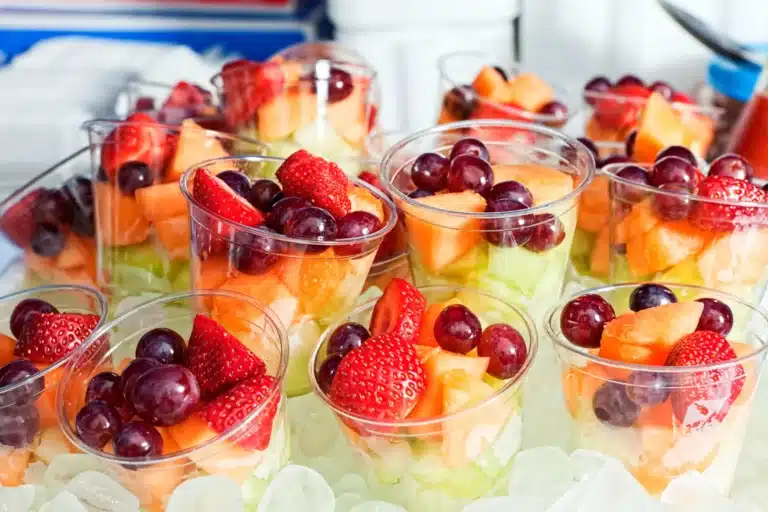Are Fruit Cups Healthy? Unveiling the Reality of Fruit Cups
Table of Contents
- Introduction
- What Are Fruit Cups?
- The Nutritional Value of Fruit Cups
- Pros of Consuming Fruit Cups
- Cons of Consuming Fruit Cups
- How to Choose Healthy Fruit Cups
- DIY Healthy Fruit Cup Ideas
- Conclusion
- FAQs
Introduction
In today’s health-conscious world, finding convenient yet nutritious snacks can be a challenge. Are fruit cups healthy? This question is more common than ever, as individuals seek to balance busy lifestyles with maintaining a nutritious diet. In this post, we’ll dive deep into the world of fruit cups, exploring their health benefits, potential drawbacks, and how they fit into a balanced diet.
What Are Fruit Cups?
Fruit cups, often found in the refrigerated section of grocery stores or packed in lunchboxes, are small, sealed containers filled with various types of fruit. These can range from single fruit varieties like pineapple to mixed fruits, often in their own juice or syrup. They’re touted for their convenience and perceived health benefits, but are fruit cups healthy in reality?
The Nutritional Value of Fruit Cups
To understand the health implications of fruit cups, it’s important to break down their nutritional content:
- Natural vs. Added Sugars: Many fruit cups come packed in syrup, significantly increasing their sugar content. On the other hand, those packed in juice or water have a lower sugar content, retaining more of the fruit’s natural nutrients.
- Vitamins and Minerals: Fruits are a natural source of essential vitamins and antioxidants, which are preserved even in packaged form. However, the nutritional value can vary based on the preservation process.
- Fiber Content: Fresh fruits are known for their fiber content, but some fruit cups may contain less fiber due to the processing they undergo.
Pros of Consuming Fruit Cups
- Convenience: Fruit cups are easy to pack, store, and consume on the go, making them ideal for busy individuals.
- Portion Control: These pre-packaged servings can help individuals manage portion sizes and calorie intake more efficiently.
- Variety: Available in various fruit combinations, fruit cups can provide a mix of nutrients and flavors, encouraging a diverse diet.
Cons of Consuming Fruit Cups
- Added Sugars and Preservatives: Some fruit cups contain high levels of added sugars and preservatives, which can negate the health benefits of the fruits themselves.
- Environmental Impact: The packaging of fruit cups raises concerns about their environmental footprint, from production to disposal.
- Cost vs. Whole Fruits: Often, fruit cups can be more expensive per serving compared to their whole fruit counterparts.
How to Choose Healthy Fruit Cups
To ensure you’re selecting the healthiest option:
- Opt for fruit cups packed in water or their own juice, avoiding those in syrup.
- Check the ingredient label for added sugars or unnecessary additives.
- Consider the packaging material for its environmental impact.
DIY Healthy Fruit Cup Ideas
Creating your own fruit cups at home can be a fun, nutritious activity with room for customization. Here are some ideas:
- Mixed Berry Blast: Combine fresh strawberries, blueberries, and raspberries for a high-antioxidant snack.
- Tropical Paradise: Mix diced mango, pineapple, and papaya for a vitamin C-rich treat.
- Classic Medley: Create a simple yet delicious cup with apple slices, grapes, and pear chunks.
Conclusion
So, are fruit cups healthy? The answer isn’t straightforward. While they offer convenience and variety, the healthfulness of fruit cups significantly depends on their ingredients and packaging. By making informed choices and considering homemade alternatives, you can enjoy the benefits of fruit cups without compromising on nutrition.
FAQs
Q: Can fruit cups replace fresh fruits in my diet?
A: While fruit cups can be part of a balanced diet, they shouldn’t completely replace whole fruits, which offer higher nutritional value.
Q: Are fruit cups good for weight loss?
A: In moderation and when chosen wisely (e.g., those packed in water or juice without added sugars), fruit cups can be a low-calorie snack option beneficial for weight loss.
Q: How long do homemade fruit cups last?
A: Homemade fruit cups can last in the fridge for up to 5 days, depending on the fruits used and storage conditions.
Remember, the key to a healthy diet is balance and variety. Including fruit cups as part of a diet rich in whole foods can help you achieve your health goals.
Here are some external resources that can provide information on how to choose healthy fruit cups:
- Mayo Clinic – “Healthy snacks: How to choose healthy fruit cups”
Mayo Clinic offers reliable health information, including tips on selecting healthy snacks like fruit cups. You can find advice on what to look for in terms of ingredients, portion size, and nutritional content.
Link: Mayo Clinic – Healthy snacks: How to choose healthy fruit cups - Healthline – “How to Choose the Healthiest Fruit Cups”
Healthline is a reputable source for health and wellness information. They likely have articles or guides on selecting healthy fruit cups, providing insights into factors such as added sugars, preservatives, and portion control.
Link: Healthline – How to Choose the Healthiest Fruit Cups - Eat This, Not That! – “The Best and Worst Store-Bought Fruit Cups, Ranked”
Eat This, Not That! often provides articles that rank different food products based on their healthiness. They may have an article specifically about store-bought fruit cups, detailing which brands or types are the healthiest options and which ones to avoid.
Link: Eat This, Not That! – The Best and Worst Store-Bought Fruit Cups, Ranked






